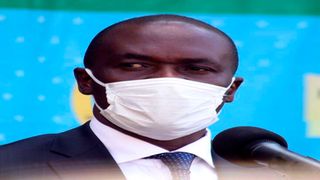
Health Services Director-General, Dr Patrick Amoth, gives an update at Afya House in Nairobi, on the Covid-19 pandemic in Kenya, on March 23, 2021.
| Dennis Onsongo | Nation Media GroupNews
Premium
Covid-19 infections to rise in cold season, experts warn
What you need to know:
- Paediatricians are already noticing a spike in the number of children with running noses, nasal congestion and coughs because of the cold season.
Health experts have warned that colder temperatures could lead to a spurt in cases of Covid-19.
Experts associate cold dry weather with the high rate of transmission of the coronavirus given that June marks the start of the cold and dry season in most parts of the country.
Dr Patrick Amoth, the acting director-general of Health, warned that with the colder season beginning, community transmission is more likely, due to lower humidity, viruses surviving longer on hard surfaces and people huddling together indoors.
This comes weeks after the Ministry of Health had warned of a possible peak in the next two months.
Dr Amoth said that going by the virus pattern in the country, a peak is always witnessed every three months.
“If you look at the mortality pattern from March 2020 to March 2021, a clear picture is coming out. Our analysis shows us we had a peak in July and after three months we had another in November,” he said.
“We can categorically state that if this trend continues, our next peak should be in July,” he said.
He said that since the start of the pandemic, the virus and the cold have been closely linked in the public mind, with the majority of hard-hit countries experiencing a spike in the number of cases during winter.
Dr Amoth also explained that in the cold season, people heat cold rooms to get warm, not knowing that it results in lower humidity.
“When everyone moves close to the heater to get warmth it can increase the risk of transmitting viruses,” he said.
Cases in children
Paediatricians are already noticing a spike in the number of children with running noses, nasal congestion and coughs because of the cold season.
“Like this month alone and since the children went back to school, I have seen over 200 children, most of them suffering from cough and flu and just like Covid-19, flu is also a respiratory tract infection,” said Dr Walter Otieno, a Western Kenya-based paediatrician.
He ruled out Covid-19, but said that they could be because of the cold weather, which tends to increase the infection.
He advised that it is that season that Kenyans should follow the preventive measures prescribed by the government to avoid the increase in the cases.
Dr Rashid Aman, chief administrative secretary in the Ministry of Health, said chilly weather has a direct link to rapid transmission of coronavirus hence undermining efforts to contain other viral respiratory ailments.
"The cold season poses various challenges for our people, including children and the elderly, particularly during this period of the Covid-19 pandemic, and extreme cold temperatures have been associated with higher morbidity among people who contract the coronavirus,” said Dr Aman.
According to a study published in Nature last year on why Covid outbreaks look set to worsen this winter, it revealed that seasonal trends in viral infection are driven by multiple factors, including people’s behaviour and the properties of the virus, while some don’t like hot, humid conditions.
Lab tests
Laboratory experiments revealed that SARS-CoV-2, or Covid-19, favours cold, dry conditions, particularly out of direct sunlight.
For instance, from the study, it states that artificial ultraviolet radiation can inactivate SARS-CoV-2 particles on surfaces and in aerosols especially in temperatures of around 40 °C.
The study looked at the growth in SARS-CoV-2 infections in the first four months of the pandemic, before most countries introduced controls. It found that infections rose fastest in places with less UV light, and predicted that, without any interventions, cases would dip in summer and peak in winter.
In winter, “the risk goes up, but you can still dramatically reduce your risk by good personal behaviour”, says the study.
Another study from the University of Sydney also found out that a percentage decrease in humidity could increase the number of Covid-19 cases by six per cent.
“Covid-19 is likely to be a seasonal disease that recurs in periods of lower humidity. We need to be thinking if it's wintertime, it could be Covid-19 time. When the air is dry, particles and aerosols tend to be smaller, which means they can float in the air for longer,” says the study.
Dr Amoth said that if everyone did what they are required to do all the time, then the cases would not increase but since Kenyans are not adhering to the measures, then the numbers are likely to increase.
“The worst is that no one is caring. Life is normal even if we keep singing about the measures no one is caring about. It is very unfortunate but in reality, we need to be very worried about the cold season,” he said.





